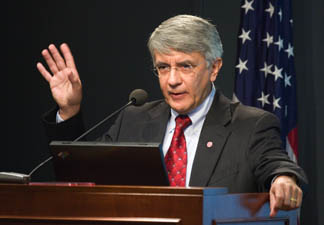Cornell's Torres organizes D.C. avian flu conference to strengthen collaborations among health and wildlife experts
By Krishna Ramanujan

If public health, animal health and wildlife management experts fail to work together and coordinate their efforts, the avian influenza pandemic, if and when it occurs, would be far more devastating than it need be.
So stressed avian flu experts from academia, the government and the private sector at a Nov. 30 conference, co-hosted by Cornell University, at the Woodrow Wilson International Center for Scholars in Washington, D.C.
Presenters at the conference, "Critical Dialogues on Avian Influenza," included key conference organizer Alfonso Torres, executive director of the Animal Health Diagnostic Center and associate dean of veterinary public policy at the College of Veterinary Medicine at Cornell. The speakers provided a complete overview of the virology, epidemiology, risks, related public policy and economics of the current avian flu situation, where it could lead and the best ways to deal with it.
Torres outlined basic background about the virus, its hosts (including poultry, migratory waterfowl, cats, tigers and humans), some examples in history of flu viruses jumping from birds to humans and the need to improve research, diagnosis and monitoring.
He pointed out that due to more stringent regulations, especially among commercial poultry producers, "what has happened in Asia will not happen here in the United States." In Asia, chickens are often raised in people's backyards and transported without restrictions, raising the opportunities to expose domestic birds and humans to infected birds. Even in Asia, avian influenza has not been detected in poultry facilities that maintain strict biosecurity standards.
The biggest risks in the United States, Torres noted, are situations where species mix, such as in live bird markets, exotic animal parks and backyard operations where birds roam freely and could come in contact with flu-carrying migratory birds.
The avian flu issue will not go away anytime soon, he added, as we are in the middle of a livestock revolution, where more meat and protein are produced to feed a growing population. "The production of poultry will continue to increase by 40 percent by the year 2020," Torres said. "And developing countries using low technology production and marketing will be generating 60 percent of the meat and 52 percent of milk by 2020." Unless changes are made, the risks of transfer of disease to other species also will increase.
Some of the weaknesses in the global animal and human health infrastructure include a limited capacity to diagnose diseases, inadequate monitoring and surveillance, and lack of research and funding. But overall, he said, animal and public health sectors and agriculture and wildlife sectors "need to do a way better job of coordinating and working together."
In the United States, though funding is lacking, "we have the veterinary infrastructure of people that can be mobilized," he said. The nation has established a National Animal Health Laboratory Network of 12 labs across the country, including Cornell's Animal Health Diagnostic Center, that have the capability to diagnose diseases ranging from avian influenza and bovine spongiform encephalitis to chronic wasting disease. Just two years ago this network included only two centers for animal disease diagnosis -- the National Veterinary Services Laboratory in Ames, Iowa, and the Foreign Animal Disease Diagnostic Laboratory in Plum Island, N.Y.
Other presenters included: William Karesh, director of the field veterinary program at the Wildlife Conservation Society; Spangler "Buzz" Klopp, a corporate veterinarian and poultry production expert from Townsends Inc.; Michael Osterholm, director of the Center for Infectious Disease Research and Policy and associate director of the National Center for Food Protection and Defense at the University of Minnesota; and Lonnie King, dean of College of Veterinary Medicine at Michigan State University.
Media Contact
Get Cornell news delivered right to your inbox.
Subscribe